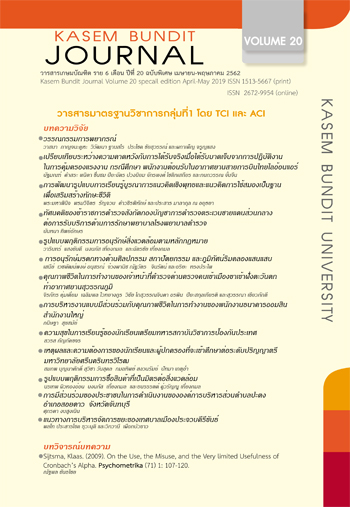Happiness in Learning among Pre-cadet Students’ in National Defence Studies Institute
Keywords:
happiness in learning,, pre-cadet studentsAbstract
This research aimed to study happiness in learning of the pre-cadet students in National Defence Studies Institute. The research samples, selected using Stratified Random Sampling, consisted of 400 pre-cadet students in Armed Forces Academies Preparatory School, National Defence Studies Institute. The research instrument used for collecting data was Likert five-point scale questionnaires with the reliability of 0.946. The study revealed that the happiness in learning as a whole was at the high level, the variables affecting happiness in learning of were learning activities, physical atmospheres, instructors, and the families(x2). These variables could predict happiness in learning for 63.8 % at the significance level of .05.
References
Meijer, J. (2007). Correlates of Student Stress in Secondary Education. [Electronic version].Educational Research, 49(1), 21-35.
Pungpond, Rukumnuaykit. (2559). Does Income Matter for Subjective Wellbeing in Developing Countries: Empirical Evidence from Thailand Microdata. Journal of Human Behavior in the Social Environment, 26(2). 179-193.
Saul McLeod. (2017). Maslows hierarchy of need. Retrieved. From : https://www.simplypsychology.org/maslow.html
Choolert, Sayompoo. (2553). Experience of Cultivated Hardiness in Pre-Cadet Commanders. (Chulalongkorn University).
Tharn, T., Paradee, A., Sukhum, M. & Kunawudh, K. (2554). A Development of Student’ Learning Happiness Indicators in Pattaya City School, Chon Buri Province. SWU Educational Administration Journal.
Boontham, Tongluck. (2560). Leadership in Digital Economy Era and Sustainable Development of Education Organizations. Technical Education Journal King Mongkut’s University of Technology North Bangkok, 7(1). 217-225.
Downloads
Published
How to Cite
Issue
Section
License
ทัศนคติ ความคิดเห็นใด ๆ ที่ปรากฏในวารสารเกษมบัณฑิตฉบับนี้เป็นของผู้เขียน โดยเฉพาะ มหาวิทยาลัยเกษมบัณฑิตและบรรณาธิการ ไม่จำเป็นต้องมีความเห็นพ้องด้วย







